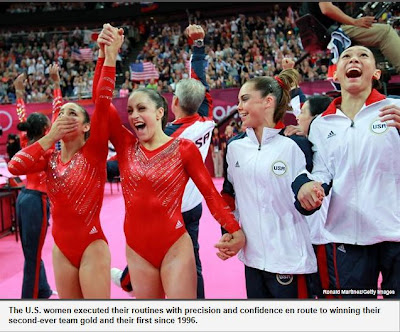It seems to me that
the some in society are unable and/or unwilling to see Black women. Consider the
photos of Michele Obama and of Gabby Douglas.
 |
| taken from Girls on the Run Facebook Page |
“Michelle
Tataranieta De Esclava, Dueña De América” (Michelle Granddaughter of a Slave,
Lady of America) was the recent featured article of the magazine Fuera de Serie. The article seems to
praise Mrs. Obama by recognizing her struggles and accomplishments. And even
calls her the “gran mujer” (great lady) behind the President Obama. The
article, in comparison to the cover, drew minimum attention.
The cover became
the story. On the cover was Michele Obama’s face superimposed on the body of
the art-historical body of an African Guadeloupean female slave originally painted
in the 1800s by Marie-Guilhelmine Benoist—a French artist.
The image used to portray
the “success” of Michele Obama belies the so-called narrative of success. Why
impose her face on an enslaved individual? Why use an image of a partially
bare-breasted enslaved woman? These choices, conscious or unconscious, mean
something. They send messages to society about how Black women should be valued
and ultimately treated.
At the recent 2012 Olympics
Black women were celebrated. They were celebrated for winning gold medals in
gymnastics and women’s track and field among other sports. But how do we see these champions?
On their Facebook
page, Girls on the Run International posted a picture of the women’s team. The
status update read,
We
love this image of the USA Gymnastics
Women's team holding hands after they won the gold in the Women's Team final
yesterday in London. This image reminds us of how so many Girls on the Run
cross the finish line holding hands with their teammates. The women of the
gymnastics team are an example to us all, not just because they won the gold,
but because of the friendship and teamwork they have shown the world. They are truly inspiring!
Girls on the Run
characterizes itself as an inclusive, multi-cultural program designed to encourage/foster
a “world where every girl knows and activates her limitless potential and is
free to boldly pursue her dreams[JJ-Z1].”
The image they used
to celebrate the friendships fostered between girls seems to belie, consciously
or unconsciously, their commitment to multiculturalism. The women’s team, not
including alternates, comprise of five young women. In the foreground of the
picture, brightly lit, front and center are four girls with tightly clasped
hands celebrating a victory. In the background, off to the side, with her back
to the camera stands Gabby. Her so-called electric and engaging smile is now
invisible to the viewing public. Her very African features are removed from
sight. In this picture that “depicts” the team we see Gabby but yet we do not
see Gabby. In a picture that depicts friendships, Gabby is excluded from the
clasp. What does this suggest about interracial friendships—Gabby is the one
African American young woman on the team? What narrative is conveyed in
separating Gabby from whiteness?
In a “post” civil
rights, “post” racial and “post” gender era, both pictures are steeped in coded
language. These images are based on statements—that is, background assumptions
of the “proper” place of Black women in society.
It’s not enough to ask are
these images racist; to do such ignores the gendered element of the pictures
and the intersection of gender and race. Thus, we lose sight of how and why
these images resonate.
Knowingly or not
these images are political acts. These images reinforce race and gender
divisions and as such they serve as an element in the system of social control.
These system of control sees Black women as highly sexualized (in the case of the Obama "picture" and as servants—there
to support others and as such not worthy of being celebrated for their individual
contributions. As I argue in Black Women,
Cultural Images and Social Policy and as argued by Black feminists, such as
Patricia Hill Collins and Beverly Guy Sheftall among others, the use of these
images results in the often negative treatment of Black women.
Even when Black
women are successful in their chosen professions, they are often not seen. Even
when Black women “play” by the rules they are often ignored. There
is a continual and sustained attempt to categorize Black women as less than
or ignore them all together. Mariah Stewart warned against this. Like she did
in the 1800s, we in the 21st Century must also challenge the impact of the intersection
of race and gender (and other oppressive structures) on our lives. As a result of the intersection of oppressive structures we are constrained and can become boxed into others expectations (often negative) of us. We
must challenge multiple and intersecting oppressive structures that are deployed in various domains such as: education,
politics, religion, and culture. To do such helps us not only to find our
voices and speak for ourselves, but brings us that much closer to freedom.



